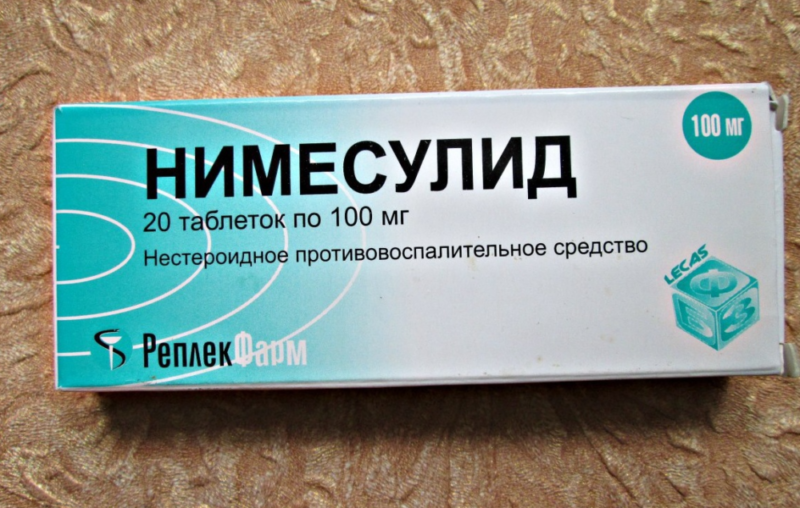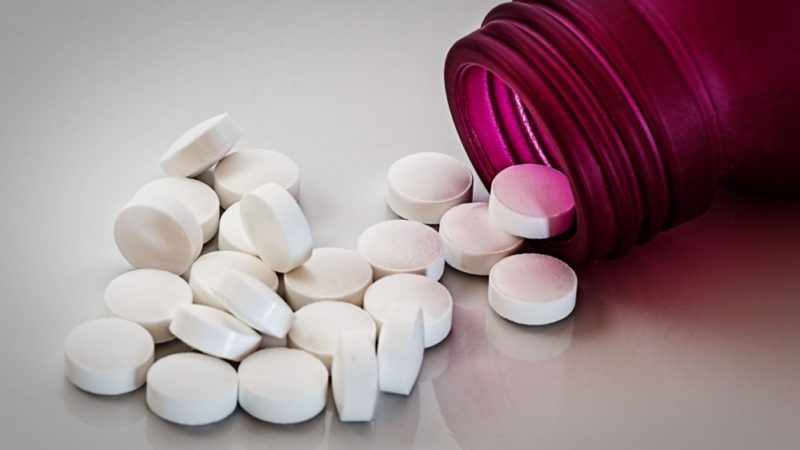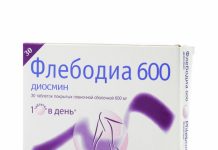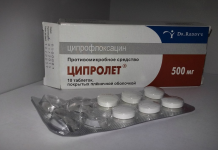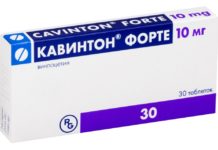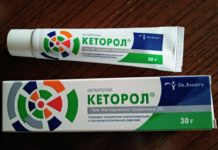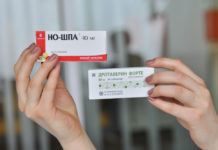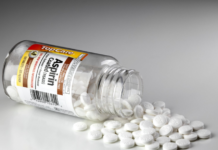Nimesulide - tablets related to non-steroidal anti-inflammatory drugs or NSAIDs. The tool has a pronounced analgesic effect. Due to its quick effect, the drug is an indispensable assistant for severe pain, but should not be abused due to the negative effect on the body.
Material Content:
- 1 Release form, composition and packaging
- 2 Pharmacological action, pharmacodynamics and pharmacokinetics
- 3 What helps Nimesulide
- 4 Instructions for use and dosage of tablets
- 5 During pregnancy and lactation
- 6 Drug interaction
- 7 Can I drink alcohol while taking Nimesulide?
- 8 Contraindications, side effects and overdose
- 9 Analogs
Release form, composition and packaging
Nimesulide is a popular drug in tablets with the same active ingredient in the composition. Each tablet contains 100 mg of active ingredient. The drug is produced by various pharmaceutical companies, so the auxiliary components may vary from different manufacturers.
The composition may additionally contain starch, lactose, silicon dioxide and calcium.
The tablets are round, yellowish-green in color. Packaging varies by manufacturer. Most often, this is an ordinary cardboard pack with the name of the drug and the logo of the manufacturer, which contains 1, 2 or 3 blisters of 10 tablets.
Pharmacological action, pharmacodynamics and pharmacokinetics
The medicine refers to non-steroidal anti-inflammatory drugs. A distinctive feature is the selective effect, manifested by the suppression of the activity of the COX-2 group enzymes and prostaglandins in the focus of inflammation.
Properties:
- anti-inflammatory;
- painkiller;
- antipyretic;
- antirheumatic.
The drug is used for the symptomatic treatment of diseases accompanied by pain against inflammation. Due to the rather complex tolerance by the body, Nimesulide is inappropriate to use as an antipyretic.
The drug is well absorbed, the maximum concentration of the active substance is achieved in about 120 minutes. The effect of the drug after taking a therapeutic dose begins in about half an hour.
Metabolism is carried out in the liver, the drug is excreted in the urine. The main part of the product is completely washed out within a day after taking the pill.
What helps Nimesulide
Nimesulide is a powerful drug for pain and inflammation, used in the treatment of pain syndrome of various etiologies.
Indications for use include symptomatic treatment of pain with:
- joint diseases;
- primary dysmenorrhea;
- prostatitis
- pulpitis;
- tendonitis;
- arthralgia;
- myalgia;
- migraine.
The tool should be used to reduce postoperative and post-traumatic pain. Despite the pronounced analgesic and anti-inflammatory effect, the drug is effective only for a short period of time (3-6 hours) after taking a therapeutic dose.
Nimesulide does not affect the course of inflammatory diseases and is used only as a second-line drug.
Instructions for use and dosage of tablets
Nimesulide helps to quickly get rid of the pain syndrome, but its effectiveness decreases after a few hours. Despite this, it is recommended to take the minimum therapeutic dose and not increase the number of tablets.
The medicine should be taken one tablet in the morning and in the evening, between doses you need to maintain a 12-hour interval. The maximum allowable course duration is two weeks.
Along with taking NSAIDs, the patient needs specialized therapy aimed at treating the disease, against which a pain syndrome has appeared. Otherwise, taking Nimesulide will give only a temporary effect, but at the same time create an additional burden on the liver and kidneys.
Like any other drugs of the same group, the medicine negatively affects the gastric mucosa, so it is recommended to take it immediately after eating.
During pregnancy and lactation
Due to the peculiarities of the pharmacological action, the medicine negatively affects the development of the fetus, therefore it is forbidden to be taken by pregnant women. The risk of miscarriage directly depends on the period for which the woman took the pill.
In the first and second trimesters, the threat to the fetus is relatively small, but not completely excluded. At this time, if necessary, it is allowed to take an anesthetic drug, but the dosages given in the instructions as recommended should be halved.
It is important to understand that taking medication in late pregnancy is the maximum threat to the fetus. An analgesic can cause kidney failure and toxic lung damage.
The drug is also dangerous for the woman herself, since at the end of the gestation period, she can provoke bleeding and premature birth by increasing the tone of the uterus.
In this regard, in the third trimester, the drug is contraindicated.
During lactation, the medicine is prohibited for use. In addition, it is recommended that women who plan to conceive in the near future are advised to refrain from pills.
Drug interaction
Nimesulide painkillers have several limitations for co-administration with other medicines.
The drug should not be taken with the following medicines:
- corticosteroids;
- thrombosis agents;
- anticoagulants;
- lithium.
Such combinations can lead to the development of gastric bleeding and exacerbation of peptic ulcer. Reception with lithium is potentially dangerous for toxic kidney damage.
Patients with edema and hypertension who take diuretics should consult a doctor about the possibility of treatment with painkillers, as they can reduce the effectiveness of diuretics.
When taken simultaneously with some antihypertensive drugs, there is a chance of kidney damage and the development of insufficiency, so such combinations are unacceptable.
You should not take several different non-steroid drugs at once.
The analgesic effect of this will not increase, but the likelihood of dangerous side effects will increase several times.
Can I drink alcohol while taking Nimesulide?
The metabolism of the drug occurs in the liver, while the activity of a number of liver enzymes is disrupted. With concomitant use with alcohol, hepatotoxicity increases, and the organ is subjected to severe stress. This is dangerous both due to complications from the liver and an increase in the activity of ethanol in the body, which is fraught with increased pressure and severe withdrawal symptoms. In this regard, the simultaneous administration of an analgesic with alcohol is prohibited.
Contraindications, side effects and overdose
The drug negatively affects the condition of the gastrointestinal mucosa, therefore it is forbidden to be taken during an exacerbation of peptic ulcer. Also, the drug should not be taken for people with Aspirin intolerance (acetylsalicylic acid).
The drug is hepatotoxic, therefore, it is not prescribed for patients with a history of alcoholism and drug addiction, as well as for cirrhosis, jaundice and liver failure.
The drug should not be taken to people with bleeding disorders and severe heart failure. Since the drug is distinguished by an impressive number of contraindications, it is recommended to take it exclusively as directed by the doctor. This is due to the fact that the patient cannot independently exclude all conditions and pathologies in which taking the medicine can harm health.
Despite all the warnings and contraindications, side effects are quite rare.
The most common adverse reactions that occur in less than 0.1% of patients include:
- anemia
- allergic skin rash;
- increased potassium levels;
- nightmares;
- sense of anxiety;
- drowsiness;
- confusion of consciousness;
- vertigo;
- tides;
- jumps in blood pressure;
- dermatitis;
- renal failure.
The most common side effect is dyspepsia. Patients experience flatulence, diarrhea, and stomach cramps. Most symptoms go away if you take the medicine immediately after eating.
If any side effect persists for more than a day, you should consult your doctor. It is especially important to consult a specialist with pressure surges, hot flashes and chills during analgesic therapy.
An overdose of the drug can lead to the following disorders:
- severe vomiting
- swelling
- neurological symptoms;
- fainting;
- acute pain in the stomach.
When taking a large dose, you must immediately take measures - rinse your stomach, drink absorbent, and provoke frequent urination. If after several hours the malaise does not go away, you need to contact a medical institution for help.
Analogs
If the doctor prescribed Nimesulide, it will be quite simple to pick up analogues, you just need to ask the pharmacy for the availability of Nise and Nimulide drugs. Preparations with the same composition are available in other, more convenient forms of release. So, the drugs Affida Fort and Nimesil are widely popular, which are available in the form of granules for the preparation of a suspension, as well as tablets for resorption of Nimulide.
With intolerance to the active substance, you can pay attention to the preparations Ketonov and Ketorolac. These drugs have similar properties, but are characterized by a large number of contraindications and side effects.
All potent painkillers, including Nimesulide, are dispensed strictly according to the prescription, therefore it is recommended to trust the doctor in choosing the optimal medicine.


